KEY TOPICS:
Colonial science in the Philippines, and internalized colonial mindsets
“Prestige” and privilege of big international organizations
Social media advocacy & how to retain your mental well-being while engaging in it
“Sachet economy” and the shaming of marginalized groups for “less environmental” practices
The need to consider the actual context of conservation problems versus copying solutions from different contexts
Fighting the “ignorant, lazy” stereotype often used against coastal communities
Different forms of knowledge and expertise
LINKS:
INTRO
Hello again, everyone! It's been a while. I got so burned out on work and everything that once I took a break from this, I lost more momentum than anticipated! But here I am again, back with Episode 10 (double digits!!!). This was an excellent conversation with my friend Jean Utzurrum, another wonderful researcher from the Philippines. She is a marine biologist and science communicator, including on Twitter @jean8rum. We first met in 2010, on a survey of Dr. Louella Dolar's for Irrawaddy dolphins in the Guimaras and Iloilo Straits in the Philippines, though Jean's work extends beyond marine mammals into fishes, including sharks and rays. She is currently a consultant for Marine Wildlife Watch of the Philippines and serves as a member of the Philippine Aquatic Red List Committee's Subcommittee for Cartilaginous Fishes and the IUCN Shark Specialist Group. If you have an ear for details, you might recall that she was mentioned by Doc Jom in her episode as being one of the few elasmobranch conservation folks who paid attention to information on how a sudden ban on mobulid fisheries affected communities.
Our conversation covered a wide range of topics: colonial science and decolonization, big international organization privilege, sentiments and words versus meaningful action, "sachet economy" and shaming of marginalized groups who are constrained to environmentally less-friendly (so-called) practices, the need for conservation solutions to reflect the reality of the context in which problems exist, the importance of dispelling misconceptions about coastal communities among conservationists, and social media. If you're interested in social media advocacy, she has some very wise words of advice! Throughout these topics, a common thread is - and here's another callback to Doc Jom - the need for common sense.
As another one of my regular reminders: I am so pleased that you're following along, whether you're listening or reading or both. It would be fantastic if you could take a little bit of your time and energy to like, share, review, comment, etc. I really appreciate your engagement in any way, and hope that this podcast can reach as many people as find it interesting and useful.
Thank you so much, Jean! I truly enjoyed this conversation with you. I am so happy to be able to share ideas from my research family in the Philippines - it's a group that I feel very honored and privileged to be included in. Here's a snippet of that beautiful song, "The Green Touch," from Soe Moe Thwin, Zyan Htet, and Min Min in Myanmar, and then we'll dive in!
[SONG]
TRANSCRIPT
T: Well, thank you so much for making the time to chat with me! I'm very happy with the representation I'm getting from the Philippines - there's going to be three of you in total for this first season. But yeah, I'd love to talk to you about a lot of different topics... [scuffling sound] this cat is going to get kicked out very soon, I think... but you know, one of things I think you're known for... I'm so sorry, I'm going to have to kick him out. Kit! I'm sorry buddy, I'm so sorry. You gotta go outside. Thank you! [Door slams]
So. In addition to your research, you're pretty active on social media, on Twitter, and I think it's really fantastic that you are there sharing your perspective, and it's a perspective that I think a lot of Filipino researchers feel, what a lot of researchers in the Global South feel and experience. I'm not active on Twitter because I think it's overwhelming, but I do enjoy seeing what you post when I'm on there. So I'd love to hear you talk a bit about parachute science or colonial science. I know Jom spoke a lot about it, but I'd love to hear a bit about your own experiences yourself.
J: So, I find it really hard or difficult to discuss colonial science or parachute science, because I think Jom really hit it on the head when she talked about colonial mentality. I said this in the Sharks International panel that I joined last year - it's a difficult topic to talk about with people from countries that were historically colonized. Because even though our countries may have gained independence, the colonial mentality is still there, and it's still very much pervasive in our everyday lives, so that when it does happen - when parachute science or colonial science happens - we're not always able to recognize that that's happening to us, right? Like, if it happens to me, I might be able to process it because I'm feeling so much frustration, but if it happens to someone else, I'll probably hesitate to call it out because they seem okay with it. So it's this weird thing to navigate. So it's very difficult to discuss because I think it would really depend on each person's self-awareness and their own experiences with foreign researchers.
But I think in my history, after college I worked in terrestrial conservation for a bit. That was really when I first started to notice these things, because as a college student I was always taught to aspire to do graduate studies abroad, to work abroad. That was the whole message: to work abroad, be successful abroad. But then I volunteered at a local center, and I ended up working at that local center, and I started to see so many foreign researchers and conservation researchers were coming to the Philippines to do their work here. And that made me question: why was that? Why were Filipino biologists and scientists in general going abroad, while so many foreigners (especially white foreigners) were coming to the Philippines?
Another thing was: why was I learning about Philippine biodiversity from foreigners? I wasn't learning about the Visayan Spotted deer from a Filipino, or all these other island endemics or Philippine endemic species. I was learning about it from foreigners who were interested in studying them and making conservation plans for that wildlife. So that what kind of when I started to question it, and started to change my plans really. I ended up not going abroad. I ended up staying here because I felt like I wanted to be one of the next generation of Filipinos. I'm not saying I'm the first - there are actually a lot of Filipino scientists and biologists who chose to stay here and work tirelessly and sometimes without the recognition that they deserve.
So it's tricky. Were those foreign researchers parachuting? They weren't - they were working with local researchers, they were working with local guides. But was it colonial? It was probably colonial, because they had that privilege of being able to go back to their country afterwards and not have to think about our problems once they submit that trip report or submit that manuscript for publication. You know, they go on with their lives. Meanwhile, we're stuck here and we have to deal with - we're left to figure out how to figure out environmental issues here with the limited funding that we may or may not have access to.
T: That's such an important point. And as someone who's on the other side of that dynamic, it's definitely something that struck me kind of early on. I had never made any explicit assumptions about the capacity of my local counterparts, either way - my assumption was that they knew more than me, really. But after a little bit of time in the field, I was like, "It's really weird that I just went to the other side of the globe to do this, and there are people here who are great at doing this." I knew why I did that, but it was just strange to me that there was this kind of unevenness in this space. It was easy for me to go to these countries, do research, and like you said, go home. Not so easy, not nearly as easy, from people from those countries to come to places like America or Australia or Western Europe and do the same and go home. There's just so many imbalances there. So I enjoy hearing your perspective from the other side.
J: And it's good that you point that out how, access-wide, it's a one-way street a lot of times. Like people from the Global North, it's so easy for them to come here, where for us it's not that easy to go abroad. And even just working within the Philippines that was colonized by Spain and also by the US, and also occupied by Japan for a while and Japan being a powerhouse country itself, we hold such high regard for foreigners. This again plays into the colonial mentality that Jom talked about, right?
In my experience, one of the first full-time jobs that I got after college was with an international non-profit organization. I saw how easy it was for me to get people's attention and to be able to get a meeting with authorities or academic personnel just to set up things. If I just introduced myself, "I'm from so-and-so international organization" it would just immediately get people's attention and get them to open the door for me so much.
Before that, I had worked part-time and just volunteered at that local center, and it would just take forever. I would have to follow-up communications almost every day, or sometimes I would have to spend hours sitting in someone's office waiting for them to read my letter and then decide whether they wanted to deal with me to discuss activities. So, even within the Philippines, it's kind of hard because of that colonial mentality that we have.
T: Yeah, and that's something that I really experienced when I was in Myanmar, when I was working for a large international organization. Prior to that, I'd really only partnered with small local groups. But then, when I was working in Myanmar, I was suddenly in the realm of these major organizations that were linked to humanitarian groups, to development organizations, to embassies. And it was really... it's kind of similar to conservation conferences, in a way, that are held in really nice, fancy, expensive hotels. It was just a strange universe where we're purporting to help marginalized people, and purporting to work in fields that are scarce in resources. And yet there's this kind of prestige or kind of ostentatious assumption that these organizations are of course going to put on an event at the most expensive hotel in town, of course the foreign personnel are going to get their own hotel rooms (*why* would they have them share with local staff?), you know? So, while I appreciated the relative luxury of those situations, I was not very comfortable with what those dynamics revealed. Lots of stuff to unpack there.
But going back to your Twitter activism. You've called out parachute or colonial science on Twitter, and I feel like you're gotten good attention for that. How do you feel about the responses you've gotten from the foreign community, from the community of researchers outside of the Philippines?
J: It's kind of weird. First of all, it was really overwhelming, because I didn't expect it - especially with the Twitter thread that I made towards the end of last year - I really didn't expect it to take off and go viral, so to speak. So I was suddenly kind of the poster child for decolonization in the Philippines. It resonated with a lot of Filipino scientists, and it was overwhelming in the sense that they were sharing a lot of their experiences, they were sharing a lot of their stories. Some of them knew the organizations that I was calling out, and they were sending me messages sharing their stories, because these were stories they never felt they could share openly. So I suddenly felt this pressure to be an advocate. And that wasn't really my intention when I started that Twitter thread - I was just calling out something that I saw and observed. So, I was suddenly being put in the spotlight, and people were reaching out and giving me platforms to talk about it. There was this pressure to do that.
In general, the response from the international community has been really positive. It's nice and reassuring to get messages of support, especially from people who are in positions to change policies regarding how research is conducted outside of their home countries, whether it's people from academia or non-profit organizations or professional societies. So it's really nice, but at the same time I think me having worked in Philippine conservation and being exposed to so many foreign researchers and conservation workers over time, I'm a bit pragmatic. I'm a bit reserved. I have my reservations about the sincerity of the words that people use. I'm sure some of them are genuine and come from a well-meaning place, but unless I actually see the action, it's hard to take it at more than just words, right?
For instance, one of the things that got me irked was the response of one of the research organizations that I called out. They didn't take accountability for what I called out. Their response was to say "That's not really us, you're confusing us for a different organization." But it was basically the same people, they just renamed themselves after some time. And I was kind of surprised by that, because... and again, this might be more to do with colonial mentality and just how Filipinos generally are, like, forgiving and we just like to give chances to people, I guess... I was kind of surprised by their response, because I would have appreciated a more diplomatic response to say the standard kind of response in those situations from an international or foreign research group, saying "We acknowledge this, and we are working hard to to correct this." That would have been more palatable, I guess, rather than to just kind of say, "Oh, that's not us."
And then one of the other foreign researchers - for context, it was a preprint paper of a study that was conducted in the Philippines, and there were no Filipino co-authors in that paper. So one of the other responses of the authors was to say, "Oh we acknowledge the invaluable contributions of this Filipinos, but they didn't qualify for co-authorship." And so these are again words... it's hard to read between the lines in how people are responding to a situation or an issue. But overall I like to think that the international community has been really supportive. It's just hard for me to take it as more than just words.
T: And I think that's completely fair, Jean. Completely fair. I mean, not just in conservation, but when people are talking about diversity and inclusion efforts, a lot of that is lip service. But when it comes down to "Oh, we're going to have to inconvenience ourselves to change this? Oh... you know, these things are difficult." And that's the answer that will really come back: "Oh, it's difficult to change things, but we sympathize with you." But I hope that some of those responses, not only were they genuine, but I hope they're met with authentic action behind them.
J: I know, for instance, with the group that invited me to be part of their panel at Sharks International, it was a workshop specific for diversifying media practices. So there was a lot of representation there from different groups, even people with disabilities, and LGBTQA. And there were of course people of color (POC). It was a whole workshop, to come up with plans for how to improve media practices. So I really appreciated that - it wasn't just like "come speak on a panel and share your stories" and then afterward you don't really know, there's no way to measure whether you had an impact when you went up on that panel and gave a talk. So I really appreciated that, and I know that they're moving forward with actually implementing some of the things that were suggested in the workshop. That's something that's there to look forward to.
But otherwise, it's really weird when people reached out to ask "How can I help you? This really resonated with me." I get it, it's genuine, and they really mean well, but I don't think they realize how tiring it is for us to come up with these solutions. Because if you're self-aware and you come from a place of privilege, and you're aware of these issues, the answers should be obvious to you. The answers should come organically from you. I don't think people realize that we have so many other issues or concerns that we're thinking of.
And decolonization, there's no urgency to it for people like me in the Philippines. There's no urgency to it. It's not like climate change or having to prepare for a typhoon or having to restrategize because a typhoon destroyed over 90% of the coral reef that had been been protected for 30, 40 years. So there's no sense of urgency for decolonization, and that's why when we actually do see and recognize that colonial and parachute science is happening to us, we often just get upset about it for maybe a day, and then shrug it off and move on because there's more pressing concerns that we need to put our energy and time into
T: That's such an important point, because not only is it unfair that you all are in a position of having to deal with the problem, you also have to spend the energy - and it's a lot of emotional energy, I imagine - calling out the problem. And you have to risk people's negative reactions, and then this influx of positive reactions takes effort to deal with. And then you're also tasked with pointing out a solution. One thing that I really appreciated Jom saying in her interview was: "It's just common sense."
J: Exactly, it's common sense. Even the positive reactions, the messages of support, it can be really overwhelming. How do I respond to it? I don't want to respond in a way that people will misinterpret, like I'm a snob or whatever, or ungrateful. So even that, even just responding to positive responses is kind of confusing and taxing as well.
T: That's really interesting. That's something that, in a different sector, my brother has experienced with his online [disability justice] advocacy, but I hadn't really thought of it in terms of conservation. It's something worth thinking about. Like if we see something like this, how can we voice our support that doesn't burden the people already dealing with the problem?
Speaking of Twitter threads, I'm going to jump to a more recent one. I'm not active on Twitter because it really makes me anxious. But I was really happy and really interested to read your "sachet economy" Twitter thread and to see that it got great response (again, I'm sure that was maybe overwhelming). I love the ideas that you shared, and I'd really love if you could explain a bit about what sachet economy it.
J: Okay, so a bit of a disclaimer: I'm not a social scientist or economist. I actually had to Google it before I tweeted about it, because sachet economy is - well, I've worked in Philippine conservation for almost 20 years and started in terrestrial conservation, and in between that I've done more broad conservation issues like plastic pollution and waste management. So this was a terminology that I had heard before a few times, and I thought I understood, but I still had to check on Google just to be sure that I was referring to the correct situation or scenario of it.
So sachet economy is basically just the popularity of using products packed in small containers or small packages. It's the popularity of using sachets versus buying in bulk. So I hope I explained it correctly, I wrote it down somewhere in proper English and all that... it just refers to buying products in small products or sachets. That's what it refers to.
T: And that's just because that's in the immediate term, the near term, to most affordable option?
J: Yeah, so again the economists would have a lot more to say on this issue. It's really just because generally people just can't afford to buy in bulk. So it just makes sure to make things available in smaller volume or quantities. Because not everyone can afford to buy in bulk. A lot of times they can just afford to buy what they need for the day or what they need for that particular moment.
And then there's also - I touched on it in my Twitter thread - there's also the aspect of the living conditions. Because there's always people who are going to say, "Oh just buy in bulk so you can reduce your plastic waste." But not everyone will have the space to store things in bulk. Not everyone will be in the right living conditions to be able to store things for the long-term. They might not have a refrigerator. They might just be renting a bed-space, not even a whole room. So they're not going to be in a position to be able to buy things in bulk or things that they need to store for a longer time.
T: It reminds me a lot of - you know, when there was that really big push to ban plastic straws? That was actually really harmful to people in the disability community. A lot of folks who struggle with mobility and with muscle coordination - for them, they actually do need straws to be able to drink things in public. And people will be like, "Well, you should bring a reusable straw!" and it's just basically expecting people who are already facing a lot of challenges in life to plan ahead, to bring reusable straws, and maybe they don't have easy ways to clean those straws, and those straws aren't cheap, and why do they need to go through this extra hoop when it's just... plastic straws, in the grand scheme of things, are not what's killing the planet. It's a very similar thing that groups that are already marginalized are somehow vilified for being stuck and needing to have more plastic-intensive products.
J: Exactly. Especially with social media and just the amount of social media Filipinos in general, even when you're from a marginalized sector, some people already have social media. It's just out there constantly, that plastics are a problem, and it's always being pointed out that we the consumers are the problem, and therefore we are the ones who need to fix it by adjusting our lifestyles by not using single-use plastics, by bringing reusables. But even myself, who - I'm glad you pointed out that those straws are expensive, because reusables are expensive, it's somewhat of a luxury here - it took me a while to actually even buy reusable cups, forks and spoons, and a reusable bento box, and the straw.
And in the end, you're right about the cleaning! When I travel, it's so hard to clean these things. Even when I'm in a city, when I take my reusable cup to a cafe, afterwards it's kind of hard to find a place to clean it out. Yeah, I can clean it out, but I might forget about it in my bag, and it hasn't been washed out with soap or anything. Like when I check back on it, it's just like gross!
T: This is why I can only use wide-mouth travel mugs that I can really get in with a sponge or brush to clean thoroughly, because I'm so grossed out by how my water bottles end up otherwise. It's disgusting!
J: So these solutions are great conceptually, and if you can afford to do them and make these lifestyle changes, great! But it shouldn't be *the* rule or the standard for everyone else to follow, because not everyone can afford to make these lifestyle changes.
T: Exactly. And I think it also comes down to people having too narrow a focus on what needs to happen for the environment to be "saved." And I think often those people who are in a position to be very preachy about these things, their lifestyle probably - my assumption - probably tends to have more environmental impacts overall than someone who is more marginalized and living with a smaller carbon footprint because they can't afford to have a more extravagant lifestyle. So, I think it's common for environmental activists from somewhere in the US wanting everyone to have a sustainable lifestyle, and in the meantime - I believe this is still the case - we are the higher per capita emitters of greenhouse gases, you know? Yeah, let's focus on the straws, but really not question how we're contributing to climate change too much.
J: I get it, because I think one of the reasons why my thread on sachet economy really resonated was because in 2021 or 2022, that report came out that Philippines was the top plastic polluter of oceans. So it was a 2021 journal article that studied how trash from rivers went to the oceans, and the Philippines topped that list. And then in 2022, someone made a very compelling visual graphic of the world's top plastic polluters of the ocean, and the Philippines topped that. And it just resonated with a lot of people, because again, we're being told that we're the problem as consumers, and therefore the solution is as simple as us cutting back on our plastic.
And the interesting thing about that thread was - now, I try not to follow for my mental well-being, but when I do post about issues like that, I can't help but check how people are interacting with it, because I am interested in how people are discussing the issue. And so one of the things that was like a subtopic of the sachet economy was some Filipinos buy in smaller packets because there was this belief that if they buy in bulk, then it's not fresh anymore, it goes bad. And I guess this makes sense if you're buying cooking ingredients, like oil, soy sauce. But even for shampoo, someone put this out there that there were some people out there who thought that it goes bad after sometime.
And I guess talking about the impact that you have on the environment, I think if you're just buying in small items, whether it's because of your financial limitations that you're only able to afford that for that day, but in my observation, people are only buying what they need. Versus if you buy in bulk, you don't really know when it's going to run out. It's just nice to have it there when you do need it. In the long term, though, your impact might actually be bigger, negatively. Because it's kind of being wasteful, because sometimes you forget about it, it's just there and it goes bad. Whereas if people are just buying what they need for that day, they're actually not wasting resources. That's kind of another aspect to that issue.
T: Absolutely. I think it's really generally an important thing for people to think about. Realize the actual situation that people are in, and trust that (I know humans are not rational, but...) in many cases there are reasons for why people do things. So I'm glad that you posted that and that it got a lot of people thinking and talking. On that note, I think that your posts that I really appreciate the most are the ones where you're correcting, let's call them, very enthusiastic conservation ideas about what fishers should be harvesting. There's a lot of shaming of fishers who catch parrotfish or sharks and rays, and I can understand: shark and ray fisheries, you need to be careful, they need to be monitored. But I'm shocked and horrified by how people will comment on those, like "I hope those fishermen die!" - and that's kind of a gentle version of some of the things that people have said. And it's so toxic and so full of misunderstanding.
So I love that you will often clarify, like "here's a picture from a market, and here's a shark, and no, it's not protected." So I'd for you to talk a little bit about why you make sure to post things like this.
J: So I don't really remember when I started doing it, but I reached a point in my social media existence where I got tired of seeing those comments. Some of them were really just horrible, and some of them are baseless accusations criminalizing people, fisherfolks for instance, for something they suppose to be illegal. It's not just the fisherfolks, there's also negative stereotypes about the community, saying "Oh, they're uneducated, they don't know any better, we need to educate them."
And it also goes to a governance level, because some people will post things accusing government officials and offices for not doing their jobs. Sometimes they will blame the wrong government agency, because you know, in the Philippines fisheries is under the jurisdiction of Bureau of Fisheries and Aquatic Resources, but a lot of times you will see comments go "DENR (Department of Environment and Natural Resources)" and their jurisdiction is really more for terrestrial.
So it's this misconception of a variety, of different stages of governance and laws and policies. So I just got tired of it. It was unfair, especially on the part of fishers and communities. It was just unfair to receive such harsh judgements. And also sometimes for the local officials, like the bantay dagat (for those of you who don't know, bantay dagat is basically the local sea wardens group in charge of coastal protection), even bantay dagat will get criticized in these comments for supposedly not doing their jobs. And a lot of times again it's just criminalizing or accusing people of being lazy and uneducated, when in fact there's nothing to criticize because nothing illegal is being done. No crime has been committed, basically.
So I just started to post things for awareness. I'm not going to change people's minds, probably, and I'm not probably going to change people's behaviors about how they interact, but I'll post it just so that people can make informed decisions about how they act in the future.
T: I was really appreciative of you doing that, because I've seen our colleagues in the field not do anything to combat that really outrageous and offensive behavior. I think if you're posting something that is prompting those sorts of awful reactions, it's kind of your responsibility to counter those - to clarify, "Oh, that's actually not a protected species" or "These communities actually do know a lot about their environments" or "These communities aren't doing anything illegal." I've seen too many people be complacent about that. So I really appreciate anyone who's willing to set the record straight.
J: Another thing that really prompted me about it was the realization that a lot of the people commenting were in positions of privilege. For instance, the educated ones! For parrotfish, for instance, a lot of the people who posted are coming from the dive tourism industry. These are people who have a lot of sway in terms of policy making. I saw this with shark conservation, as well, in like 2012, 2013, before the first Sharks Summit, a lot of the dive industry were really mad because someone posted photos or videos of dead sharks, and it just blew up. And suddenly people were calling for total bans on shark fishing.
And it's the same thing with parrotfishes. These people were calling for total bans on parrotfish, but a lot of times people don't realize that total bans don't work, because a lot of our fishing gears are meant for multi-species. So you can't just ban, stop the fishing or landing of one taxonomic group, because essentially you would be shutting down entire fisheries even for other taxonomic groups that you're not targeting in your campaign. So these are things that I just realized, these were comments coming and as passionate as they are, these were people coming from privilege and with the power to influence policies. It just felt really unfair to the people or communities who would be impacted by those sorts of policies.
T: I also feel that people overestimate how effective shame is. It is effective, unfortunately, but it's not the best way to get something changed, and it's really not a good way to establish with partnership with people who are going to need to be an active part of the solution. You can't make communities feel horrible about the things they're doing and then expect them to be the ones upholding sustainable practices after that.
J: And I think this also ties back to colonial mentality, because a lot of times a lot of our policies are top-down. I'll always hear some sort of version of "this is how this problem was addressed in first world countries, and look how successful they are." And then we take that and try to apply it here, without really understanding or considering the differences in our socioeconomic, cultural, and political realities. So it's essentially setting us up for failure, because we have to acknowledge that we're different and things need to be different. We can't have policies that are top-down; we really need for conservation work to start from the bottom, involve the communities. Because a lot of times they're not really uneducated. I'm sure you're encountered this; I've encountered this in my interviews with fishers. They have such a wealth of knowledge, it's just not in English or it's not "technical" but some of the things about oceanography I've understood better from fisherfolk than from a textbook. They're not uneducated. They do have a wealth of knowledge that can be used and channeled toward solutions. So I think there needs to be more of an inclusive approach that's not just top-down. It really has to start with communities.
T: I agree with that, 100%. I think there's this harmful idea that, while those of us in relative positions of privilege have spent our lives getting educated and building up skills and experiences, that people in villages have somehow just passively and primitively just been hunting for fish. No. There are very intelligent people living in these villages. They are very practical. They are very strong. They're very resilient. They learn just as well as anyone else does. I'd love to see that recognized more.
What are the reactions you've gotten to your posts correcting these misconceptions? Has it been kind of mixed, or mainly positive?
J: So, I don't know, because Filipinos are generally passive aggressive. A response would be like a "like" or a "heart" on a post. People won't necessarily comment on a post. This is why I prefer Twitter, actually - the engagement on Twitter is better - people will actually reply or quote-tweet something. The reactions on Facebook are a bit more passive. I try to check on Facebook. There have been a few posts of mine that will get people's attention, that will get them commenting.
For the most part, it's been positive. Someone will say "I didn't know this; thank you for sharing your input." And then there are some people who are sympathetic to fishers and communities who will say something like "thank you for clarifying that this is not illegal, that they're not doing anything wrong." And then there are of course the very passionate people who will stand by their beliefs and say something like "just because it's not illegal doesn't mean that it should continue happening, that these should continue to be fished." And, okay, that's your opinion. When I get those kinds of responses, I don't think they need a response in return.
T: They're not in a space of self-reflection.
J: They're just sharing their opinion as well, or reacting to my post. And that's something that I really had to learn over time was that not every reaction is going to warrant a response. Because some people are just going to say whatever they need to get off their chest, and that's kind of how I am when I post things sometimes. Like, oh, it's been on my mind, I need to clear up space in my head basically, so I'll just post it so it's out of my head and I can move on with my day. And I'm not necessarily posting it to get engagement or discussion. I'm just posting it so it's just out there. And I feel that the people who comment back or reply to those posts are kind of like that as well. They just need to get those thoughts out and feel like they've been heard.
So I just let them be, basically, because that's their opinion. I'm not going to be able to change everyone, but at least there's some people who will go and might not post about it in their replies but someone might go, "Oh yeah, it's not illegal." So I mean that's the best that I can hope for, that people realize that not everything is illegal, that there actually policies at work.
T: That's very pragmatic of you, Jean! That's very wise. I feel that many people would benefit from following that mindset on social media. It's also very compassionate of you!
J: I've had a lot of practice. Because sometimes I would get so obsessed following up on "what are people saying?" I would get too anxious about it, too, like "oh, that might get negative attention" or whatever. And I'd realize, oh, no one's commenting on it. And it's not necessarily that they don't care. It could just be that with the algorithm, they didn't see my post. Or it could be that they're busy, or they're going through something else that they don't have time to react to it. So I think in recent years with my social media presence, I've kind of had to learn to not take things personally when I do those kinds of posts.
T: Absolutely. I think that, not only is it important that you're trying to set the record straight about things that are not illegal and things which fishers should not be sent death wishes for (I mean, they should really never be sent death wishes!), but something that I feel strongly about is that people need to understand that there's a lot of complexity and nuance to conservation. It's not as easy as in the kid's cartoons about conservation, that you have an evil corporation doing something and there's good people on this side, it's just evil versus good, these two forces opposing... it's actually really complex. And you can have people who are doing harm to ecosystems, and they don't have bad intentions, they're not ignorant, they're not necessary bad actors. It's just a situation that's complicated.
Going into this complex, interwoven situation with the mindset of "there must be a villain somewhere, and I want to blame them!" is really such a mismatch with reality.
J: I agree. This ties with almost every other issue, including decolonization. Our tendency is to want to blame someone, and then want to just hear all the positive things. But that way we're excluding potential solutions or sources for good ideas, because we're only going by what we feel agrees with us, and we're failing to see and understand what really the problems are, what they're rooted in, why these problems persist. We're failing to see those dynamics because we refuse to acknowledge that these issues are complex.
I know especially with an older generation, we tend to see work as delineated: science should just be science. It shouldn't be political. I'm just doing the research, and doing work for community is for social scientists. I just care about my data. I'll submit my data to the local government and it's up to them how they want to translate it and do whatever they want with it, and that's where the social scientists come in. And that's just all backstop.
But it shouldn't be the case and we have to acknowledge that these issues are really complex, there are different layers. There are different magnitudes of problems. For instance, for fisheries, you have fisheries at a small-scale and then at a larger, commercial level, and in first world countries, there are fisheries at an industrial level. And there are different players at each of these levels. Those different players might have different dynamics with each other, and different levels of understanding of the issue and of the solutions as well.
So it's really complex. I think we need to start acknowledging that we can't solve things on our own. We really need, at the very least, to hear each other out. I don't expect people to work with each other immediately, but at the very least, we need to be able to sit down with each other and have honest conversations about these issues.
T: That would make a world of difference, for sure. Well thank you so much, Jean. It was so nice to see you, and we interact on social media, but it's really nice to see you and talk with you and learn from you.
J: Well thank you for having me. I know this took a while to set up. I'm glad that it's finally out there. And I want to congratulate you on your podcast. I know this was a long time coming. I just how it's evolved, and I think it's important to have voices like yours, like "conservation realist" - we've talked a lot about this in the past! - so yeah, congratulations and I'm looking forward to more of your episodes.
T: Thank you so much, Jean. I really appreciate your opinion on that, so thank you! Alright, have a good... day... it's daytime over there. And we'll be in touch!
J: Alright, okay you too!
ABOUT JEAN
Jean Asuncion T. Utzurrum is a marine biologist and science communicator. She holds a bachelor's degree in Biology from Silliman University. After college, she worked in terrestrial conservation as an education officer for Fauna and Flora International - Philippines before returning to her alma mater to pursue a Master's of Science in Marine Biology.
She has since co-authored several publications on marine mammals, mesophotic fishes, and sharks including Pating Ka Ba? An Identification Guide to Sharks, Batoids, and Chimaeras of the Philippines.
She is currently a consultant for Marine Wildlife Watch of the Philippines, and presently serves as a member of scientific advisory bodies for sharks and rays, namely the Philippine Aquatic Red List Committee – Subcommittee for Cartilaginous Fishes and the International Union for the Conservation of Nature – Shark Specialist Group.

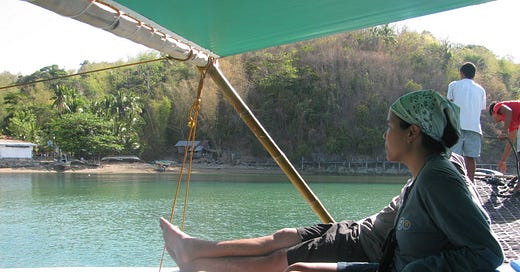



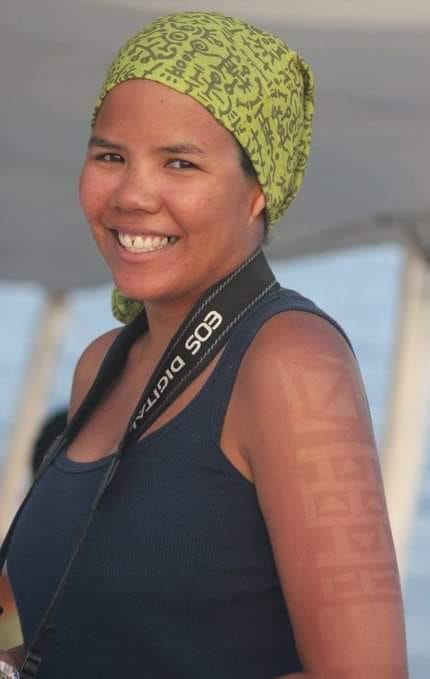


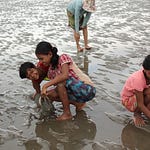


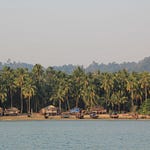
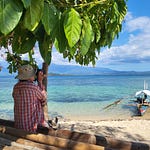


Share this post